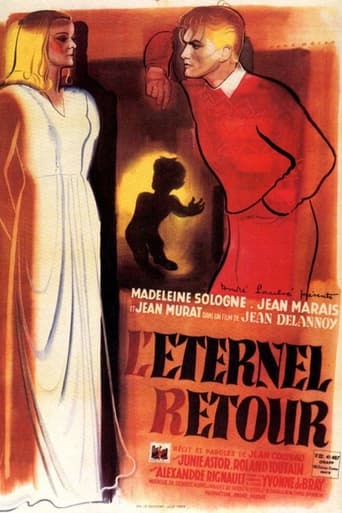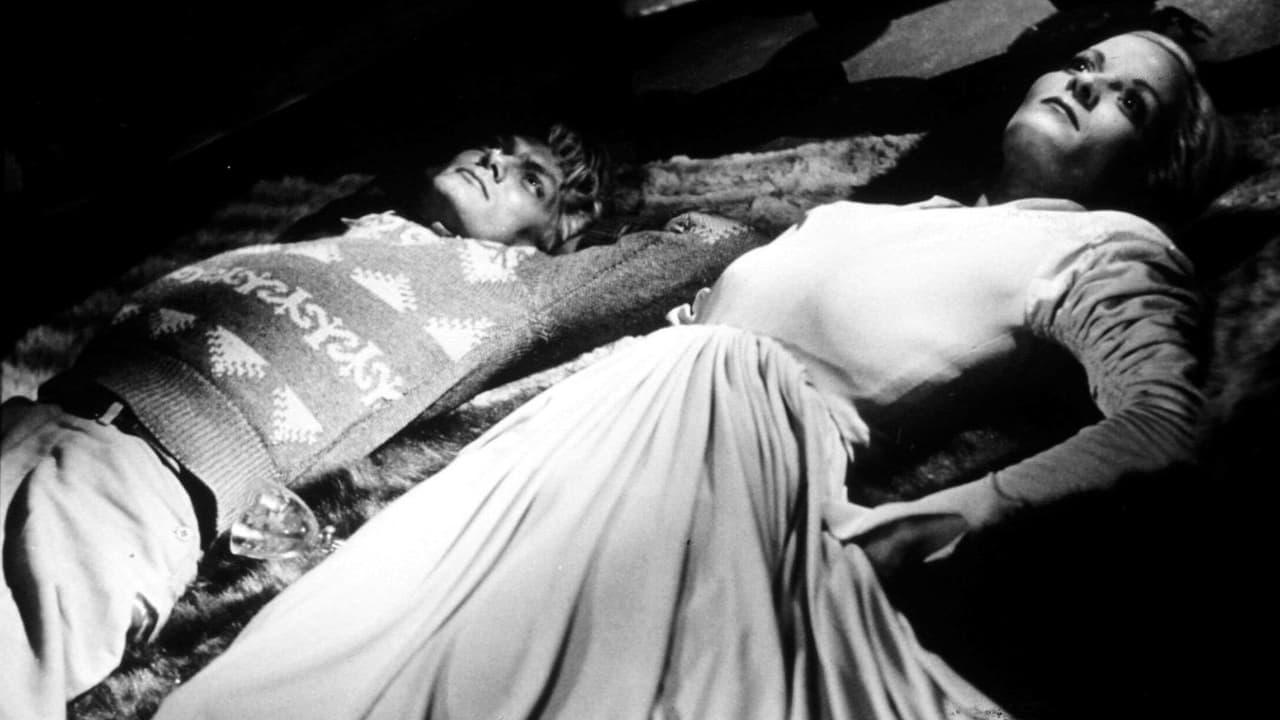morrison-dylan-fan
Talking to a fellow IMdber on the Classic Film board about movies made during the Occupation of France,I got told about an excellent sounding title written by auteur film maker Jean Cocteau that I have never heard of before.Deciding to watch 5 French films related to the Occupation era,I decided to find out if this is burning an eternal flame.The plot:Visiting his family in a secluded castle, Patrice finds that his uncle Marc is being mistreated by jealous relatives Achille, Gertrude and Gertrude Frossin.Desperate to bring some light into Marc's life,Patrice makes a deal with Marc,which involves Patrice finding a wife for him,who will hopefully bring some happiness into Marc's life.Living under the constant threat of getting married to a violent man, Nathalie la blonde decides to escape to a near by island,with the only object that she takes being a remedy in a jar marked "poison",which a relative claims will lead to any man who drinks it falling deeply in love with her.Meeting Patrice on the island,Nathalie soon finds that despite Marc's various attempts to catch her eyes,that her gaze solely on Patrice.Desperate to put an end to their blossoming fairy tale romance, Achille decides to one night secretly give Patrice & Nathalie the "poison",which leads to Patrice & Nathalie soon developing an eternal love between each other,from which there is no return.View on the film:Accused at the time of germanophilia,director Jean Delannoy & cinematographer Roger Hubert give Nathalie la blonde (talk about a subtle last name!) and Patrice an almost alien appearance,due to Delannoy and Hubert covering Nathalie and Patrice in an elegant light,which whilst originally seen as giving them a "pure"/Aryan look,actually show Nathalie & Patrice's love to be a fairy tale romance.Contrasting the ultra-stylised appearance of the lovers,Delannoy give Patrice's household a murky,gritty atmosphere,with Delannoy keeping any bright lights to a minimum,which allows for the dark,deceitful shadows of the Frossin's world to be revealed,as Delannoy shows the darkness from the Frossin's slowly "poison" Nathalie and Patrice fairy tale world.Bringing the Tristan and Isolde legend to Vichy France,the screenplay by Jean Cocteau takes a sly allegorical shot,with Nathalie and Patrice households being shown on 2 different island,with one being wealthy and prosperous,whilst the other has almost returned to the Medieval ages.Keeping away from focusing too much on the allegorical elements,Cocteau keeps modern machinery to its lowest possible levels (such as people having cars,but no phones at all) in order to tell a fantastic fairy tale,with Cocteau delicately building a real sense of love between Nathalie & Patrice,which the Frossin household tries to tear away from reaching its happy ending. Running across the screen like Satan's little helper, Piéral gives a wickedly evil performance as Achille Frossin,with Piéral stealing every scene he is in with a wide devilish smirk which contains a deadly relish,as Achille sets his sights on turning Patrice & Nathalie's love into a doomed romance.Blocking their love, Jean Murat gives a great performance as Marc,who Murat shows has an initially playfulness towards Patrice,which slowly turns into an uncompromising sternness,as Marc finds himself having to force Nathalie and Patrice love apart.Looking absolutely radiant, Madeleine Sologne gives an extraordinary performance as Nathalie la blonde.Being separated from Patrice,Sologne gives Nathalie a raw vulnerability ,by covering her face with a naked soulfulness that perfectly shows the sorrow that Nathalie is carrying for her love. Aching to see his love again, Jean Marais gives a brilliant performance as Patrice which balances the light fairy tale atmosphere with the allegorical undertones,thanks to Marais giving Patrice a real passion in his voice,whilst turning his face into a "pure" shell,which finally cracks as the film shows Patrice & Nathalie la blonde love to enter an eternal return.
writers_reign
If I put my mind to it I could probably get a reasonable Term Paper out of poets during the Occupation but on the other hand I wouldn't want to put the Academic-Pseud axis out of work. What brought this on, you ask. Well you might. Fact is I've just watched Jean Delannoy's L'Eternal Retour for the first time and was struck by the resemblance to Marcel Carne's Les Visiteurs du soir which was released one year earlier in 1942. Both films were written by poets (although Jean Cocteau was a poet more in his mind than mine whilst Jacques Prevert was the real McCoy. Prevert ended Les Visiteurs du soir with a stunning poetic image; the Devil, slightly miffed that the envoys he sent to earth to screw up the mortals plans had actually fallen for the mortals in question, duly petrified two of the lovers but as we gaze on the two statues we hear their hearts continuing to beat. Cocteau, being a lesser poet, settles for a more pedestrian ending leaving the two lovers lying side by side a la Romeo and Julient and, just in case we don't get it, having the husband of the woman intone solemnly 'now no one can come between them'. Although he didn't direct his take of Tristan and Isolde Cocteau ensured that the lead went to his life-long lover Jean Marais, a graduate of the Forestry Commission School of Acting and perhaps for his own pleasure he has Marais 'pose' a couple of times for no apparent reason. By coincidence Carne was himself homosexual as were Cocteau and Marais, which has no bearing on either film yet you can see how that old Academic-Pseud axis would be standing in line to book sabbaticals and write this up. Delannoy was a pretty good filmmaker as it happens and the records show that this was one of the most popular films released during the Occupation. I have no quarrel with that and I'm pleased to have finally seen it.
chill1019
I see the Nazi references, but there are subtle subliminal messages being sent to the French people who were under the jackboot of Nazi oppression. It was not a proud time for them. Remember that during the Middle Ages, Vikings invaded France from the North. The men from the North who became the Normans finally assimilated nicely with the people living in northern France. Men who were expert sailors learned farming and the language of the "French". Re-telling the Tristan story always seemed to me to be a way to reach the soul of the French. It's a way to remind them of the time of the brave knight who comes to the rescue of his lady. The blondness of Patrice and Nathalie could be a reference to the Normans. They are both orphans of the sea and the death scene with both of them positioned perfectly on a boat(linked eternally)with the skies parting to bring them up to heaven is very reminiscent of the French epic poem "Chanson de Roland". It also reminds me of a dead Viking warrior being cast out to sea on his burning boat. A film to be enjoyed on many levels and a way to appease the Aryan loving Nazis while resonating with the proud history of the French.
leeyan-marquez
Jean Cocteau's influence is indelible in this clever and sophisticated romance. Cocteau is at his most affecting when he adapts popular themes - in this case the Arthurian legend of Tristan and Isolde - and gives them a verisimilitude that challenges even modern sensibilities.Patrice (Jean Marais) is a stunningly handsome young man who is supremely confident of his legacy. An orphan, his Uncle Marc clearly favors him over his cousin Achille (Pierre Perial), a malevolent dwarf who is as stunted morally as he is physically. Who can blame him? Achille is the son of Marc's wife's sister Gertrude (Yvonne de Bray) an eternally scheming, gossiping shrew who clearly has designs over Marc's fortune. Things come to a head after Patrice playfully sics his dog on Achille and Gertrude uses this incident to harass her brother-in-law. Marc agrees to let Patrice find him a young wife who would help him weather the strain of living with his no-good relatives, as well as revenge himself upon Gertrude for making his life as unpleasant as possible.Patrice manages to find Nathalie, a orphan like himself, a beautiful foreigner who lives in constant fear of a drunken brute who threatens to marry, then eventually kill her. He comes to her rescue and when he proposes marriage, she is overwhelmed that the dashing Patrice has appeared - like some deus ex machine - offering her a way out of a mean and harrowing life, but not in the way she had hoped. What astounded me about this film was how Cocteau was able to establish within a few scenes the tensions that underline the malevolence and envy of Marc and Patrice's dysfunctional in laws, Achille and Gertrude, roles which were marvelously acted. They never descend into hand-wringing caricatures because their evil is presented as something as arbitrary as their circumstances which, as Gertrude asserts and Marc himself acknowledges, are unfair. When these characters are away from the scene, the movie tends to lose its harrowing emotional depth. When other characters are introduced in the story, although these characters are also nicely fleshed out and wonderfully acted, you can't help but think that they would never hold a candle to Achille and Gertrude.As for Patrice, you can't help but wonder at the way the blonde behemoth lights up the screen whenever he strides into the frame. But the film makers thankfully resisted the temptation to just make the character eye candy: despite being dashing and heroic, he can also be remarkably selfish, immature and casually cruel. I can't be sure if it's just bad subtitles but his callous treatment of Achille is cause for grounds. He takes digs at his cousin's deformity and despite claiming that his pet doesn't bite, he sics his dog on someone who isn't much larger than a child. Typical of his callousness is the way he dangles an impossibly wonderful life in front of the tragic, hapless Nathalie, only to make plain his real intentions later on. When she does accept his proposal, you wonder if it was because she had backed herself into a corner from which she couldn't hope to get out of. Hers was essentially a choice of the lesser evil: living in close proximity with a man whom she clearly loves but never being able to possess him, as opposed to living with a man whom she despises and threatens her harm.When the film was released, the shining couple of the story was either held up as an example of the ideal pairing of male and female beauty, or as noxious pro-Aryan Nazi propaganda, and it CAN BE unsettling how so Nordic these two people are that their blondeness just leaps out and clubs you on the head despite the fact that the film is in black and white. It doesn't help that the final tableau and the opening frame of a giant hand cannot escape allusions to Nazi imagery - perhaps these were thrown in to help the movie get made. Yet it also made sense - for Patrice and Nathalie indeed look like they were made for each other (their common features and origins are explained) and the beauty that had marked them out for happy ever after begets the envy that eventually destroys them.All in all, a film that deserves to be studied as seriously as the more landmark films in Cocteau's oeuvre.


 AD
AD
